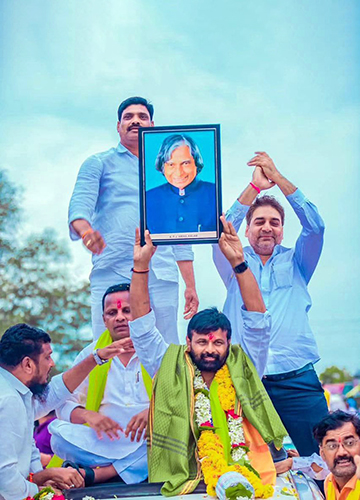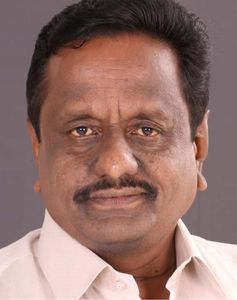On the morning of November 4, only hours after he declared at a news conference, sniffling and in tears, that the time was right for Marathas to exact vengeance on the Maharashtra government for the economic hardships heaped on the agrarian community, Manoj Jarange Patil returned to face the news crews again. “It is not possible to contest on the basis of only one community,” he said. Muslim and dalit parties, who he had been in talks with until 3am, had not sent lists of candidates they were to jointly back.
Across the Marathwada region of Maharashtra, scores of Maratha candidates who had filed their nomination papers for the November 20 assembly elections were directed to withdraw from the fray. To a question on who or which party/alliance he would direct Maratha voters to reject, Jarange Patil said he would spell out his mandate soon.
Even without an edict from the leader of a series of statewide agitations seeking reservations for Marathas from within the Other Backward Classes quota, the morning announcement on the last date for withdrawal of nominations was an inflection point.
The anger of the Maratha community―almost 31 per cent of the state’s population―is considered one of the biggest factors in the Bharatiya Janata Party-led NDA’s poor show in the Lok Sabha elections this summer.
Amid the post-Haryana election political tailwinds for the Mahayuti combine of the BJP, the Shiv Sena (Eknath Shinde faction) and the Nationalist Congress Party (Ajit Pawar faction), Jarange Patil’s announcement indicated the possibility of a repeat, at least in some regions, of what the Maratha leader himself acknowledged as the Lok Sabha pattern.
Of the state’s 288 assembly constituencies, Marathas voting en bloc can be a decisive factor in about 150 seats, but Jarange Patil’s impact will be felt most strongly in the Marathwada region, the central Maharashtra swathe of eight districts, mostly drought-prone and historically arid, where formerly prosperous Marathas have suffered consecutive decades of slow impoverishment from agrarian distress.
Marathwada, which elects 46 legislators to the Vidhan Sabha, witnessed dramatic upsets in the Lok Sabha elections after Marathas announced that they would vote against the Mahayuti.
The alliance consequently suffered a near-total rout in the eight Lok Sabha seats of Marathwada―their solitary win came in the Chhatrapati Sambhajinagar (formerly Aurangabad) constituency, where Shiv Sena (Shinde) candidate Sandipan Bhumare, a Maratha and a minister in the state government, won. Local Maratha voters’ support for Bhumare had been carefully garnered, with no less than Chief Minister Shinde negotiating with Vinod Patil, the Sambhajinagar-based coordinator of the Maratha Kranti Morcha and one of the petitioners in the Maratha reservation litigation. Vinod Patil had aspired to win a BJP or Shiv Sena (Shinde) candidature during the general election, but was eventually mollified by the chief minister.
The Mahayuti’s losing candidates in Marathwada included leaders of significant stature, such as Pankaja Munde in Beed, former Maharashtra minister and daughter of late BJP leader Gopinath Munde, the region’s tallest OBC leader; former Union minister of state Raosaheb Danve in Jalna, also of the BJP; Archana Ranajagjitsinh Patil in Osmanabad, wife of a sitting NCP (Ajit Pawar) MLA and daughter-in-law of Padmasinh Patil, a major regional satrap and former minister in the Congress-NCP state government; and Mahadev Jankar of the Rashtriya Samaj Paksha, a Dhangar community leader who broke away from the Mahayuti ahead of the assembly election.
Incidentally, the Ma-Dha-Va or Mali-Dhangar-Vanjari axis, a tried-and-tested caste strategy for the BJP in Maharashtra, is to be replaced this election with a much more localised mobilisation of each of dozens of OBC communities in order to counter the Maratha-Muslim-dalit alignment.
Of the eight victorious Lok Sabha candidates in Marathwada, only one was a non-Maratha―the Congress’s Dr Shivaji Kalge from the Latur constituency, reserved for scheduled caste candidates.
 Tough terrain: The mahayuti’s losing candidates in marathwada in the general elections included big leaders such as Pankaja Munde (right) and Raosaheb Danve | PTI
Tough terrain: The mahayuti’s losing candidates in marathwada in the general elections included big leaders such as Pankaja Munde (right) and Raosaheb Danve | PTI
However, the latest developments have split the Maratha vote wide open, said Rajendra Kondhare, state coordinator of the Maratha Kranti Morcha, the ‘leaderless’ movement of Marathas that staged dozens of mook morchas or silent marches across the state in 2016-17 to press for reservations for Marathas and dilution of the Atrocities Act, among other demands. Kondhare told THE WEEK that the Jarange factor had considerably weakened since the Lok Sabha result.
“For one, Marathas have begun to realise that what he is demanding―reservation for Marathas within the OBC quota―will never be possible,” said Kondhare. “So their current mood is to take what is being given, and keep for later the question of who gave it to them.” He said both alliances have the chance to convince Maratha voters of who actually worked for their benefit.
He said Jarange Patil’s decision not to field candidates favoured the opposition Maha Vikas Aghadi marginally, but there was recognition among community members that the best possible result may have already been achieved in the Mahayuti government’s decision to grant the community reservations. “To give the reservations within the OBC quota will not be possible for any political alliance―this talk of repealing the 50 per cent cap on reservations is not practical, for it may go against the basic structure of the Constitution on representation for the unrepresented,” said Kondhare. “And people have begun to understand this.”
Jarange Patil’s goodwill with Marathas may not have declined, but his opinion on whether his followers should formally enter the electoral fray has appeared to yo-yo frequently, and followers said fatigue had begun to set in.
In March 2024, soon after former MP Prakash Ambedkar suggested that Jarange Patil, then on the fifth day of a hunger strike, should contest as an independent candidate from the Jalna Lok Sabha seat, the Maratha leader told THE WEEK that electoral politics was not his preferred route, adding that he would consider the matter more substantively ahead of the assembly elections.
Since then he has, on occasion, threatened to field candidates in all 288 seats; suggested that Maratha activists should contest seats where they stood a chance of winning; or asked Marathas to defeat specific candidates; later appeared to be attempting an alliance with Muslim and dalit leaders not aligned with either Ambedkar’s Vanchit Bahujan Aghadi or the MVA.
Jarange Patil, who has previously singled out Deputy Chief Minister Devendra Fadnavis in his tirades, has repeatedly said leaders in the state had joined forces that oppose reservations for Marathas. He was alluding to the sharp Maratha vs OBC political contest emerging in the state, another factor that could dull the edge of the “Lok Sabha pattern”.
Laxman Hake, the face of the counter mobilisation of OBC communities against Jarange Patil’s demand, said the Maratha agitationist’s decision not to field candidates was a move scripted “in Baramati”, suggesting that Jarange Patil may have been propped up by Sharad Pawar.
Hake said the Marathas had backed off from an electoral contest fearing the unity of large numbers of caste groups. “Voting by these castes will determine the winner in 60-70 seats,” Hake told THE WEEK. Hake said he was backing OBC candidates contesting as independents in a handful of seats scattered across Marathwada and western Maharashtra.
He was not working in favour of the Mahayuti, he said emphatically, adding that he would support any candidate, including of the MVA, who vowed to defend and protect the OBC quota from the Marathas’ demand.
Hake, a teacher belonging to the Dhangar caste, had earlier demanded a probe into whether Kunbi caste certificates were being granted to Marathas without proper scrutiny to enable them to avail reservations enjoyed by OBCs (Kunbis, who are counted among OBCs, are a sub-caste of the Marathas). Hake also undertook a counter-fast during one of Jarange Patil’s hunger strikes. Followers of the two leaders have come to blows in various parts of the state in recent months.
Meanwhile, political leaders and activists looking to repeat the consolidation of anti-BJP votes have been in touch with Jarange Patil in an attempt to prevent the splitting of anti-NDA votes.
Lawyer and human rights activist Asim Sarode, who met the Maratha leader last week, told THE WEEK that he and others tried to convey to him that fielding candidates would weaken the main thrust of his agitation in multiple ways. “We told him that certain political parties are keen for him to contest or field candidates because that would lead to division of votes,” Sarode said. He said their message to Jarange Patil was that a Haryana-like outcome could be repeated on account of a division of votes. “A party that claims to be among the world’s biggest and economically strongest parties, which purchased MLAs in the past, could easily purchase a few Maratha candidates who win upon being backed by Jarange Patil,” said Sarode. “We welcome his decision.”
Taking no chances, the six main parties have themselves strategically fielded Maratha candidates where an upset of a sitting Mahayuti MLA is possible. For example, Congressman Rajesaheb Deshmukh will be Sharad Pawar’s candidate against incumbent MLA and minister Dhananjay Munde of the Ajit Pawar faction in Parli, in Beed district. Seats where rebellions and friendly contests with fellow partymen are likely could further eat into the Maratha vote.
Over the course of the 30-minute news conference on November 4, Jarange Patil spoke once again of the income inequality, unemployment and the farm crisis that catalysed his agitation. As another round of agitational politics winds down into an electoral contest, the party that better articulates its engagement with those subjects could well hold the key to the Maratha vote.





